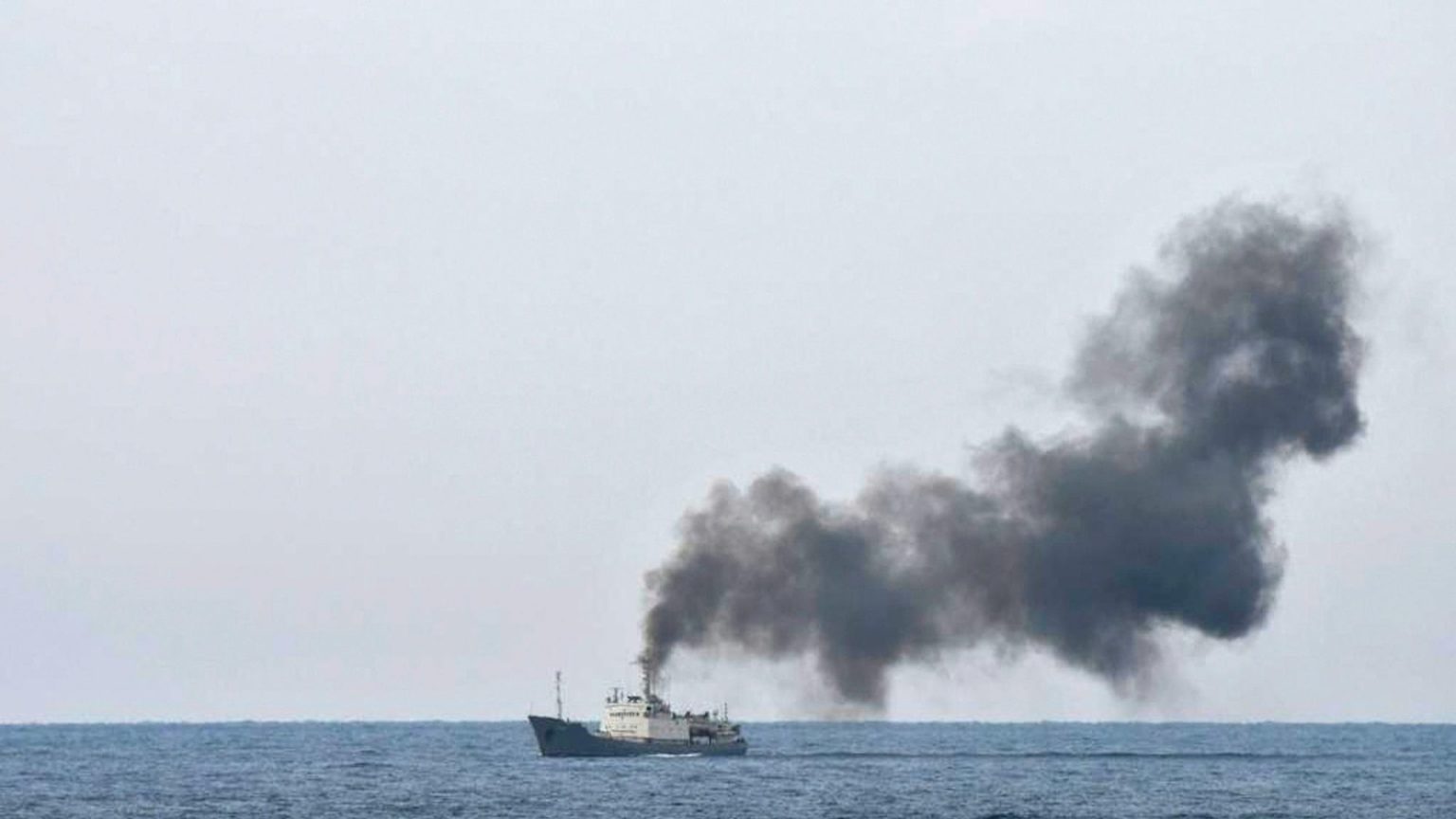A Glimpse Into Russia’s Spy Ship Operations
In a rare and intriguing incident, a Russian spy ship, the Kildin, was heard transmitting a distress call over the radio on January 23, while it drifted out of control off the coast of Syria. The vessel, packed with advanced intelligence-gathering equipment, was seen emitting flames and black smoke from its smokestack. The audio of the exchange, obtained by the Associated Press, reveals a man with an accent instructing another ship to keep its distance. “Warship on your course,” he says. “I am drifting. I’m not under command.” The broadcast offers an unusual insight into the operations of Russia’s secretive fleet of spy ships, which have been under close surveillance by NATO nations due to concerns about potential sabotage of underwater cables and pipelines, especially amid heightened tensions over the war in Ukraine.
Military officials from a NATO country, who shared the audio, video, and photos with the AP, revealed that the Kildin was temporarily unable to command its movements. However, despite an offer of assistance from a nearby NATO vessel, the Russian ship refused help and did not respond to the offer. This incident highlights the mysterious and often isolated nature of Russia’s spy ships, which operate in sensitive areas and rarely engage with other vessels.
The Fire Aboard the Kildin
The Kildin, a 55-year-old Russian spy ship, was conducting intelligence-gathering activities in the Mediterranean when the blaze erupted. The officials revealed that the fire burned for at least four hours, forcing the crew to take emergency measures. They removed the covers from lifeboats, though no lives were lost, and hoisted two black balls from the ship’s masts—a maritime signal indicating loss of steering control. The crew eventually regained control of the vessel, and the Kildin is still operational, stationed off the Syrian port of Tartus, accompanied by a frigate and a supply vessel. It remains unclear what caused the fire, and Russian authorities have not publicly addressed the incident.
Retired Vice Admiral Michel Olhagaray, a former head of France’s center for higher military studies, noted that even though the ship managed to regain control, the incident underscores the logistical challenges Russia faces in maintaining its naval presence in the Mediterranean. Far from its Arctic and Baltic Sea bases, Moscow’s fleet must operate in a region where resupply and maintenance are more complex. This becomes even more complicated given that Moscow can no longer rely on its Black Sea Fleet for Mediterranean patrols, as Turkey—which controls the Bosporus strait connecting the Black and Mediterranean seas—has restricted warship movements since the onset of the Ukraine war.
The Broader Context of Russian Naval Activity
The Kildin incident took place while the ship was monitoring NATO activities in the Mediterranean, particularly near naval exercises conducted by Turkey, a NATO member. The officials who spoke to the AP emphasized that Russia’s spy ships like the Kildin are a critical component of Moscow’s efforts to gather intelligence on NATO’s military movements and operations. These ships are equipped with advanced technology designed to intercept communications and monitor naval activities, making them a key asset for Russia’s military strategy.
However, the challenges faced by the Kildin are not isolated. In recent months, NATO has tracked increased Russian naval activity in European waters, raising concerns about potential threats to critical undersea infrastructure, such as cables and pipelines. For example, in January, the U.K. reported that it had monitored another Russian spy ship, the Yantar, which was “loitering over critical undersea infrastructure” in the English Channel. The Royal Navy responded by dispatching a submarine to shadow the vessel and signal that its movements were under surveillance.
A Radio Exchange Reveals Tensions at Sea
The audio recordings obtained by the AP provide a candid glimpse into the tense interactions between Russian and NATO vessels. During the Kildin incident, the Russian crew initially identified themselves as the “Sky,” a different ship, before switching channels and revealing their true identity as a warship. The voice of a man with an accented English can be heard saying, “Motor vessel Milla Moon, this is warship on your course. Please hear me.” He then instructs the Togo-flagged cargo ship to steer clear, stating, “I am drifting. I’m not under command.” The Milla Moon responded by agreeing to alter its course and signing off with a polite, “You are welcome. Good watch. Goodbye.”
Military officials also provided a second recording, capturing conversations among the crew of the NATO ship that intercepted the exchange. They can be heard identifying the Russian vessel as the Kildin and discussing its distress signal. While the AP could not independently authenticate the recordings, ship-tracking data supports the account, showing that the Milla Moon was in the vicinity of the Kildin off the Syrian coast on the day of the fire.
Moscow’s Response and the Implications
When asked about the incident, Kremlin spokesman Dmitry Peskov downplayed its significance, stating that he was not aware of the fire and dismissing suggestions that it reflected poorly on the Russian navy’s readiness. “Assessing the state of the fleet based on the breakdown of one particular ship or one particular malfunction is not professional,” Peskov said. However, experts argue that the incident is emblematic of the broader challenges Russia faces in maintaining its naval presence in distant regions.
Vice Admiral Olhagaray pointed out that the Mediterranean is a particularly difficult theater for Russia, given its limited access to local bases and the growing pressure from NATO to monitor its activities. The Kildin fire, while not catastrophic, serves as a reminder of the strained resources and logistical hurdles that Moscow must overcome to sustain its naval operations. At the same time, the incident underscores the heightened scrutiny Russia’s spy ships are under, as NATO nations seek to counter what they perceive as a growing threat to critical infrastructure.
As the situation in Ukraine continues to escalate, the activities of Russian spy ships like the Kildin will remain a focal point for both military officials and international observers. What this incident ultimately reveals is the delicate balance of power at play in the world’s oceans, where even a single malfunction can offer a rare glimpse into the shadowy world of naval espionage.















